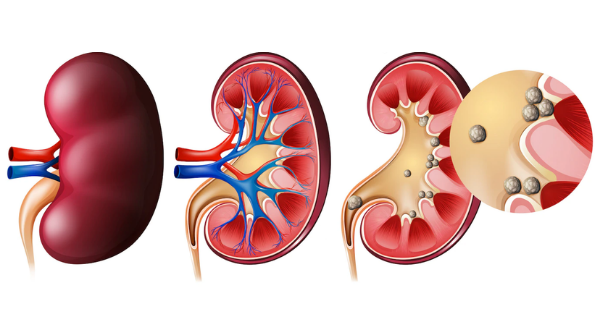What is a kidney stones?
Kidney stones (also called renal calculi) are hard deposits made of minerals and salts that form inside your kidneys.
Urine has various wastes dissolved in it. When there is too much waste in too little liquid, crystals begin to form. The crystals attract other elements and join together to form a solid that will get larger unless it is passed out of the body with the urine. Usually, these chemicals are eliminated in the urine by the body’s master chemist: the kidney. In most people, having enough liquid washes them out or other chemicals in urine stop a stone from forming. The stone-forming chemicals are calcium, oxalate, urate, cystine, xanthine, and phosphate.
After it is formed, the stone may stay in the kidney or travel down the urinary tract into the ureter. Sometimes, tiny stones move out of the body in the urine without causing too much pain. But stones that don’t move may cause a back-up of urine in the kidney, ureter, the bladder, or the urethra. This is what causes the pain.

Causes of kidney stones:
- drinking too little water
- exercise (too much or too little)
- obesity
- weight loss surgery
- eating food with too much salt or sugar
- infections and family history
- eating too much fructose (fructose can be found in table sugar and high fructose corn syrup)

Kidney stone symptoms:
- severe pain on either side of your lower back
- more vague pain or stomach ache that doesn’t go away
- blood in the urine
- nausea or vomiting
- fever and chills
- urine that smells bad or looks cloudy

Suggestions for patient with kidney stones:
- For those who want to maintain functional of the kidney, you are suggested to drink at least 3.5 litre per day. Apparently, the most crucial way to prevent the formation of kidney stones is by increasing the intake of water. Water can dilute urine to prevent the accumulation of minerals and salts.
- Reduce the intake of animal-based protein or even totally remove it from daily meals. Diets containing animal protein can cause calcium to be excreted from the body, causing excess calcium, phosphorus, and uric acid in the kidneys, resulting in often painful kidney stones.
- If you have a family case of kidney stones, take a calcium supplement with meals. When you eat high-calcium foods with oxalic acid, calcium binds to oxalic acid and is excreted in the poo, reducing the possibility of getting kidney stones.
- Try avoid all refined sweets and products containing refined sugars. Sugar stimulates the pancreas to secrete insulin, which results in extra calcium being excreted into the urine.

Misconception of Nuewee Protein
- Nuewee Protein contains fructose, patient with kidney stones cannot consume Nuewee Protein?
Eating too much fructose will cause kidney stones. However, Nuewee Protein has only 1.25g fructose which is less than tomato (1.7g), orange (3g), apple (10g) and banana (6g)! So, patients with kidney stones can consume Nuewee Protein!
2. Nuewee Protein will cause kidney stones?
Consuming too much animal protein can increase a person’s risk of kidney stones. However, Nuewee Protein is a plant-based protein. So, Nuewee Protein is safe to consume.
Also, Nuewee Protein contains calcium that can help to reduce person’s risk of kidney stones. This is because calcium and oxalate bind together in the intestines, interrupting the formation of stones. Patients with kidney stones may discuss their individual protein needs with a doctor, as the requirement will vary from person to person.

